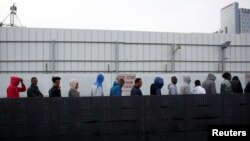Israel has begun issuing deportation notices to thousands of African migrants.
Almost 40,000 African migrants are facing an uncertain future after Israel began issuing deportation orders that amount to an ultimatum: The migrants can take an offer of $3,500 and a one-way plane ticket to Rwanda within 60 days, or face imprisonment.
Most of the migrants came from war-torn Sudan and Eritrea over the past decade and entered Israel illegally. Many say that going back to Africa is not an option, so they will choose the lesser of the two evils.
"I will go to prison" in Israel, said Katir Abdullah, who came from Darfur. He said Rwanda is not his country and the only things waiting for him there are persecution, unemployment and poverty.
Israel is sending the migrants to Rwanda after assessing it as a safe country with a growing economy. Rwanda denies Israeli claims that it has agreed to take in the migrants.
Adam Ahmad, who is from Sudan, says paying people to leave is a betrayal.
“Now it is so sad that Israeli people put African people, or African asylum seekers, for sale; and that’s so sad,” he said.
Israel refuses to grant the Africans asylum, saying that they are economic migrants and not refugees. Officials say Israel was created as a refuge for the Jewish people and not for the masses fleeing poverty in Africa.
Interior Minister Aryeh Deri said Israel’s first obligation is to its own people. He described the Africans as "infiltrators" who have brought crime and misery to the streets of South Tel Aviv.
Israeli police statistics, shared by the nonpartisan Times of Israel newspaper, indicate 90 percent of African asylum seekers live in the southern part of Tel Aviv, with the rest scattered nationwide. In the poor, crowded neighborhood of Neve Shaanan, these migrants make up 70 percent of the population but commit 40 percent of the crimes, according to police data.
Human rights activists here say Israel should be the first to assist the Africans because the country was built by Jewish refugees fleeing the Holocaust.
"We have always asserted that the world was silent" during World War II, said Colette Avital, who heads the Center of Organizations of Holocaust Survivors in Israel. She warned that Israel must not be silent and must lend a helping hand to those in need.




